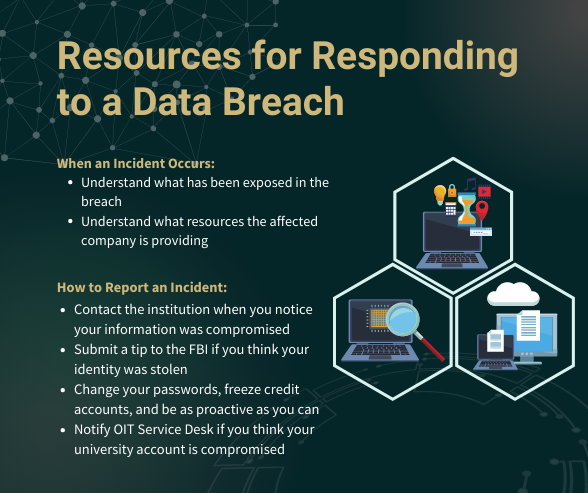Responding to a Data Breach
Aug 17, 2023
Protecting Your Identity During a Data Breach
There are steps you can take to help protect yourself during a data breach including determining what sensitive information may have been exposed and changing your passwords.
Resources for Security Incidents
Communications about a data breach and a malicious party obtaining a certain amount of data have become all too familiar from major corporations and institutions, such as the latest number of incidents that have occurred because of MOVEit software vulnerabilities. Due to the increased nature of these events outside the university, we want to provide guidance on what to do when an incident like this occurs as well as provide information about the resources that are available to you so that you can protect the sensitive information that a malicious actor obtained in the incident.
When an Incident with a 3rd Party Affects Your Personal Accounts
The affected company will likely notify you of the breach of your personal information via email and/or by postal mail. When you receive a notification, it is important to read through the entirety of the message to understand exactly what data has been exposed, and the free resources the company is offering to help prevent identity theft. These resources typically come in the form of identity or credit monitoring services.
How to Identify and Report an Incident with a 3rd Party Vendor that Affects Your Personal Accounts
An example of a red flag indicating that your personal account has been compromised is when you receive a multi-factor authentication (MFA) prompt from an account that you do not own and did not log into. Indicators that your credit card or banking credentials may have been compromised can include charges that were not made by you or any unusual charges or activity indicating that funds have been removed from your bank account. In both instances, the first thing you should do is call the financial institution where your account resides and report it to them.
Once you file a report, the company usually takes you through steps on what to do to prevent the unauthorized user from accessing those accounts again. If your data from the data breach is being leveraged and it has escalated to identity theft, you can submit a tip to the FBI notifying them that you believe your identity has been stolen. The FBI provides a plethora of resources that can be used when your identity has been compromised.
How to Protect Your Identity and Credit Score
To learn more about ways to protect your identity, visit the Federal Trade Commission's identity theft website. There are resources such as Annual Credit Report, Experian, TransUnion, or Equifax t hat you can utilize to safeguard your identity and credit score. These services are free, and they monitor online activity to ensure that malicious actors are not opening financial accounts in your name or making big purchases with your information. If you would like to implement more security measures to protect your data after an incident, you can contact your insurance provider to see if they have any additional resources that will help protect your identity. An example of such resources can be found at the Anthem Identity Protection Program AllClear ID website.
For Your University Account
If you believe your university account has been compromised, there are different steps you can take to report it and receive help. Call the Service Desk at 303-724-4357 as soon as you realized your account has been compromised so that the necessary steps can be taken in order to prevent any further damage from occurring.
When it comes to responding to these types of incidents, it is better to be proactive so the damage of the incident can be contained and minimized. The best defense against malicious actors is situational awareness and constant monitoring of personal accounts to ensure no damage has been done.
